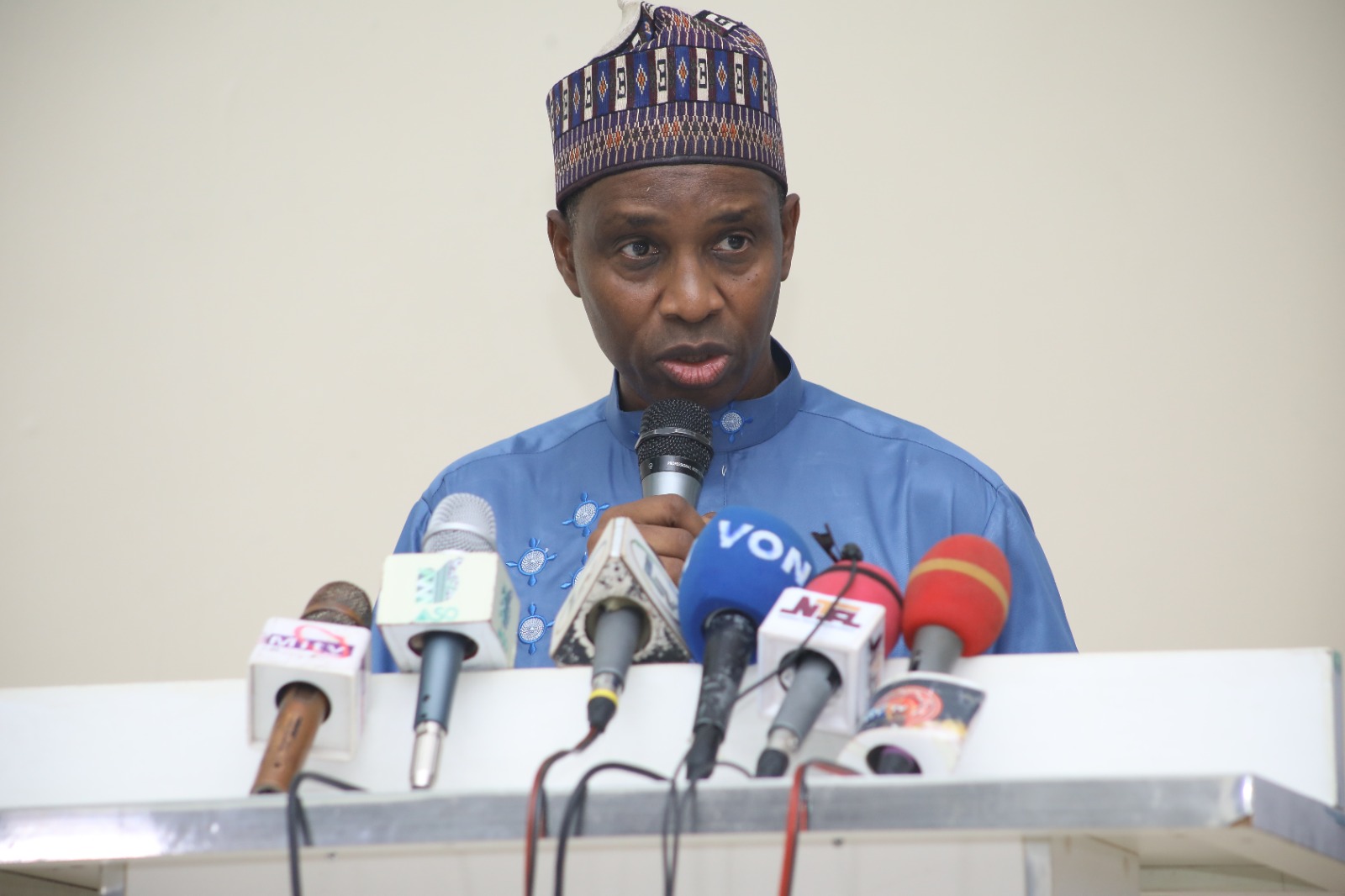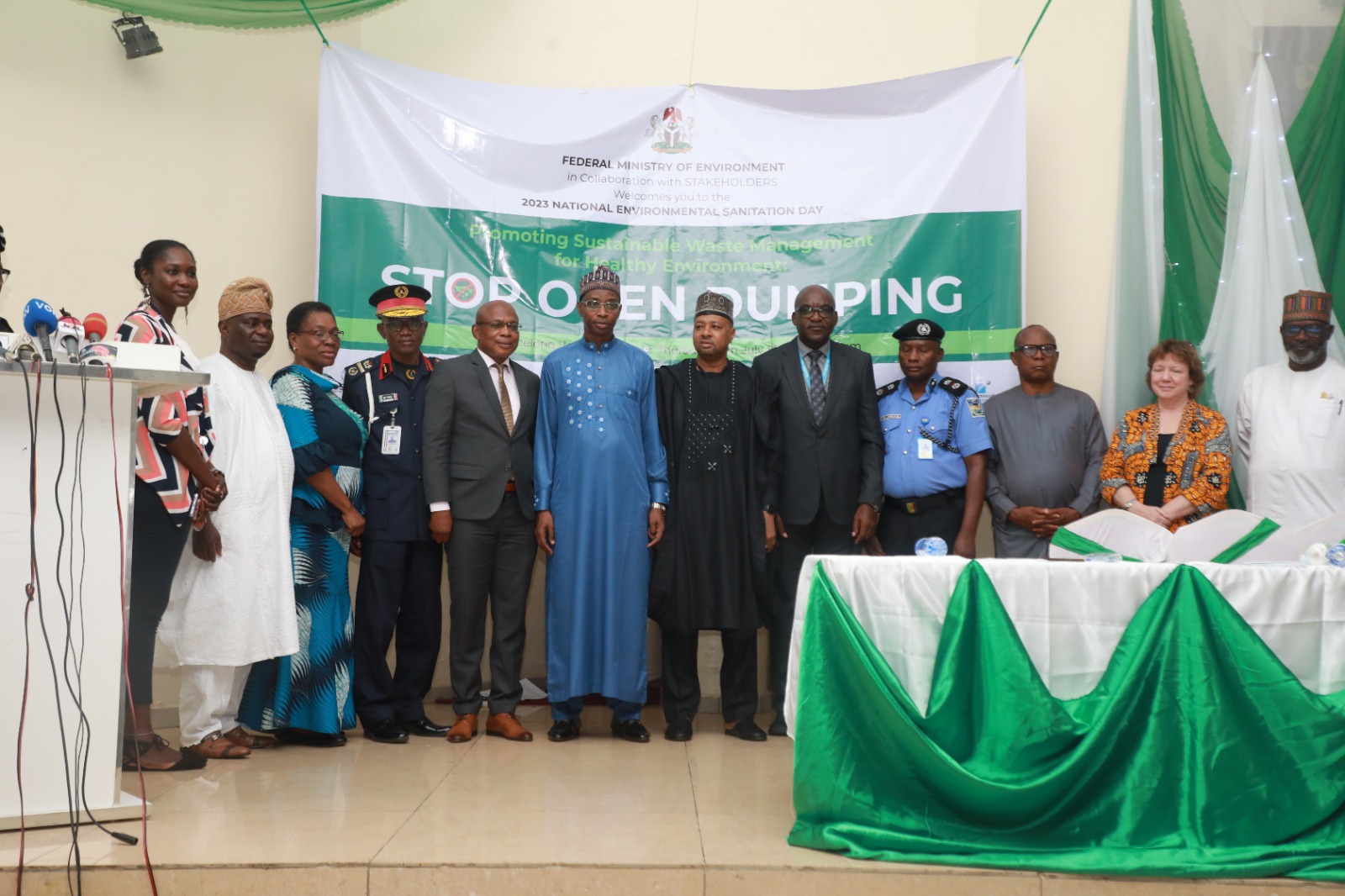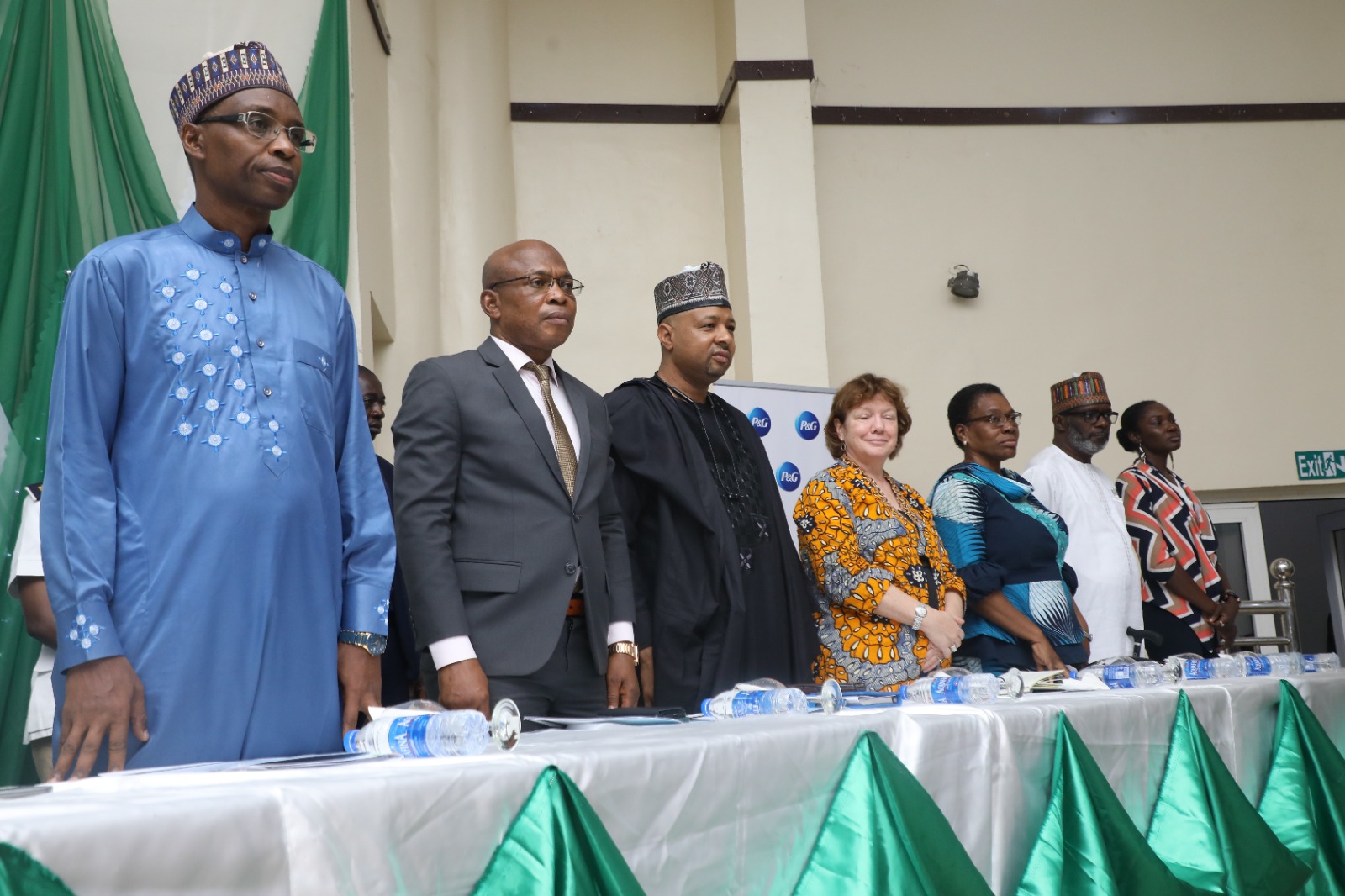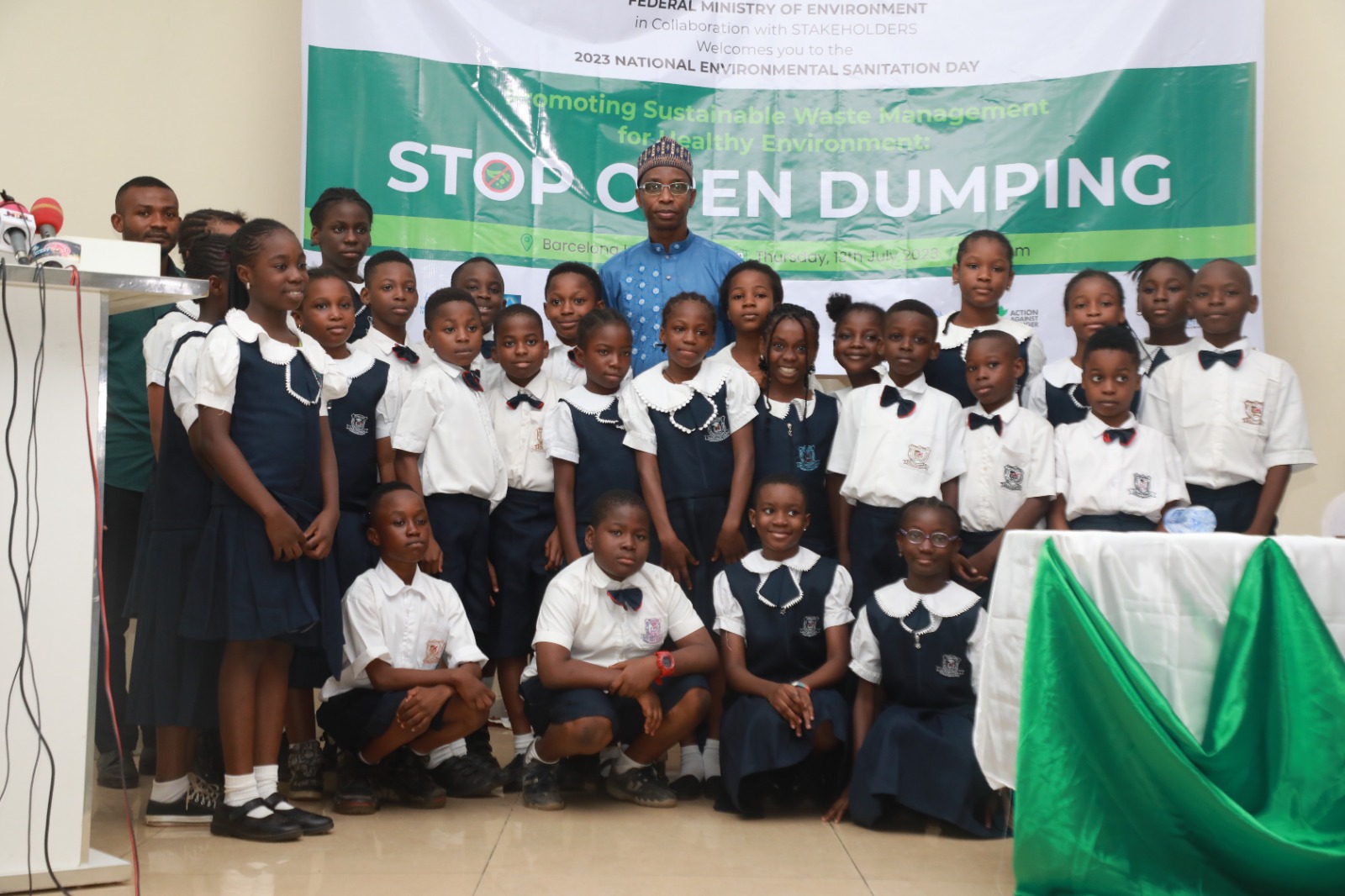
By Miriam Humbe, Abuja
Permanent Secretary in the Federal Ministry of Environment, Alhaji Ibrahim Yusuf has urged all State Governments, Commissioners of Environment, Local Government Chairmen and Councilors, Environmental Health Officers, NGOs, CBOS, FBOs, Development partners, Organized private sectors, Traditional and Religious leaders etc. across the country to actively step up their Sanitation and hygiene campaigns as an effective means of controlling and preventing disease transmission.
The Permanent Secretary said this in a keynote address on Thursday during the climax of activities to mark the 2023 National Environmental Sanitation Day in Abuja.
Humsimedia gathered that poor sanitation was responsible for a significant percentage of preventable communicable diseases particularly in developing countries including Nigeria.
The Perm Sec revealed that large number of children die every year due to sanitation and hygiene enabled diseases.
He said more than 3.5 million children suffer from diarrheal diseases which is not a small figure, with children, who are less than 5 years old, more prone to such diseases.
Yusuf said that the advent of emerging and re-emerging diseases such as COVID-19, Lassa Fever, Monkey pox, Cholera etc. in Nigeria further underscored the fact that access to sanitation and hygiene was not only a fundamental human right safeguarding public health and human dignity, but also an essential need when it comes to disease prevention.
The Perm Sec therefore emphasized the need for adequate enlightenment Campaigns at all levels of government.
He said: “The importance and benefit of creating awareness, behavioural change and institutionalization of sanitation and hygiene practices among the citizens are our drivers in implementing this programme at this time.”

The National Environmental Sanitation Day is a national advocacy day dedicated to increasing awareness and understanding on the importance of sanitation and hygiene.
It is also an effective and affordable way to prevent diseases, save lives and ensure effective and quality sanitation delivery services as well as meeting the Sustainable Development Goals (SDGs) 3, 6 and 7 by 2030.
This year’s themed: “Promoting sustainable waste management for a healthy environment: stop open dumping” could not be more apt and timely considering the critical role sanitation and hygiene play in preventing and controlling the spread of infectious diseases such as Cholera, Typhoid fever, Lassa Fever, COVID-19 virus, Monkey pox virus etc.
He said the theme is also a clarion call for every one of us to work together and leverage on lessons learned from response to COVID-19 to address the neglect of Sanitation and hygiene as a major means of preventing and controlling transmission of sanitation & hygiene associated infectious diseases.
Recall that the National Environmental Sanitation Day Commemoration was declared by then President Olusegun Obasanjo in 2005 at the launch of the National Environmental Sanitation Policy document and required the day to be commemorated on 28th June annually.

Since then, the Federal Ministry of Environment in collaboration with stakeholders has been celebrating the day to mark the importance of sanitation and hygiene as a veritable tool for disease prevention and control.
The 2023 edition was commemorated on Thursday 13th July, 2023 because of the sallah day that fell on 28 June, 2023.
This year’s National Environmental Sanitation Day, therefore calls for individuals, communities, governments at all levels, development partners etc. to be involved in the planning and implementation of sanitation and hygiene activity within their immediate environment, community and the nation at large.
In 1999, The Federal Government through the Federal Executive Council (FEC) approved the movement of the sanitation mandate from other line Ministries, Departments and Agencies (MDAs) providing sanitation services to form part of the Federal Ministry of Environment and ever since then, the Ministry in its effort to promote clean and healthy Environment has been carrying out programmes and activities in the following areas: Development of National Environmental Sanitation Policy and its guidelines in 2005 on Pest and Vector Control, School Sanitation, Market and Abattoir Sanitation, Sanitary Inspection of Premises, Solid Waste Management.
It also includes Safe excreta and sewage disposal whose policy document was reviewed in 2019, Construction of public toilets in public places like Schools and markets; development of National Policy on Solid Waste Management, National Policy on Plastic Waste Management.
Others include establishment of Plastic Recycling Centres across the country, community intervention programmes on open defecation including sensitization advocacy and awareness creation programme, Establishment of Environmental Health Council (EHCON), NOSDRA, NESREA etc.
In addition, the Federal Ministry of Environment has been carrying out sanitary inspection of all Federal Government establishments, including Federal Government Schools, Ministries, Parastatals, Agencies Military and Paramilitary Barracks, Correctional Centres (Prisons), Public places such as Petrol Stations, Abattoirs, motor parks, markets and regulated food premises such as hotels, eateries e.t.c. while the states and LGAs use the policies and guidelines developed as guide for their daily routine for sanitation and hygiene activities in the states and LGAs.

The Perm Sec said that the environmental sanitation was imperative for socio- economic development.
He said: “Its impact on all the Sustainable Development Goals, (SDGs) cannot be overemphasised most especially SDG Goal 6-Improved Access to Clean Water and Sanitation.
He said that the proportion of people without sustainable access to basic sanitation in the recent analysis revealed that less than half of the Nigerian population has access to improved sanitation facilities.
He said: “In addition, many of our city centres, communities and households still battle with the problems of waste management.”
This year’s National Environmental Sanitation Day commemoration commenced on Saturday, 8th July 2023 with sensitization and flag-off of cleaning exercise in Kuchigoro Community in FCT where the Chief of the Community encouraged his subjects to imbibe the culture of Environmental Sanitation.
Alhaji Yusuf assured that the Environment Ministry, FCT and other stakeholders would sustain this community environmental sanitation programme after the commemoration.
He also said that the Environment Ministry in collaboration with Breakthrough Action Nigeria would continue with similar community sanitation, sensitization and cleaning exercise programmes in Benue and Bauchi States.
He said that 36 states and the remaining 6 Area Councils of FCT were also celebrating NESD today.
He said: “Finally, let me reiterate that the National Environmental Sanitation Day is more than just a day; Sanitation and hygiene should become an integral part of our everyday life.
“I therefore urge Governments at all levels, all media organizations, Development Partners to join the Federal Ministry of Environment and other stakeholders in propagating Sanitation and hygiene practices to the general public, children, families, communities, associations etc. as one of the measures to reduce the country’s disease burden and ensure a Sustainable Waste Management for a healthy environment and to also stop open dumping.
“I wish to express deep appreciation for other Permanent Secretaries & Heads of MDAs present as well as WHO, UNICEF, UNDP, Water Aid, UNEP, BA- N, NCDC, Action Against Hunger, P&G, media etc. and other partners supporting Sanitation and Hygiene in Nigeria”.
Children from schools in the FCT were also in attendance as Sanitation Ambassadors.


